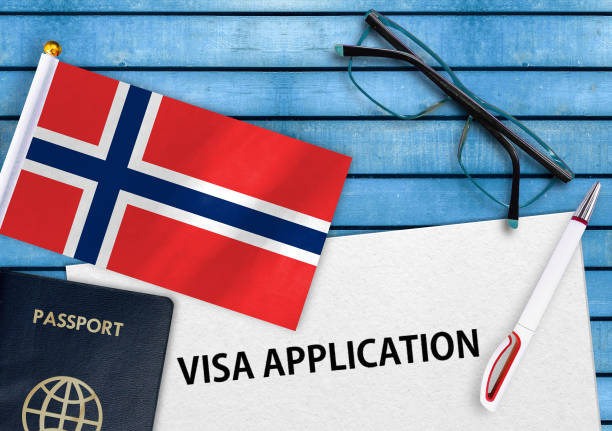Pathway to the Fjords: A Comprehensive Guide to PhD Scholarships in Norway for International Students
Embark on an intellectually stimulating and life-enriching journey by pursuing a PhD degree in Norway, a land renowned for its breathtaking fjords, cutting-edge research, and commitment to sustainability. This comprehensive guide equips you, the international student, with the knowledge and strategies to navigate the diverse landscape of PhD scholarships in Norway and transform your research aspirations into a rewarding academic experience.
Advertisements
Introduction: Unveiling a World of Research Excellence
Norway boasts a vibrant research environment fostered by prestigious universities, world-class research institutes, and a strong focus on innovation. Funding for research and development is a national priority, making Norway an attractive destination for international PhD students seeking to contribute to groundbreaking discoveries and advancements in their chosen field. A PhD scholarship in Norway provides financial support throughout your doctoral program, allowing you to fully immerse yourself in research pursuits without financial constraints.
Demystifying PhD Programs and Scholarships in Norway
Understanding PhD Programs in Norway: The Norwegian PhD program typically follows a structured format:
- Duration: PhD programs in Norway generally last for three years, with the possibility of an extension for up to one year under special circumstances.
- Coursework: While primarily research-oriented, some programs might include coursework during the first year to strengthen your research foundation and methodological skills.
- Dissertation: The core of your PhD program is the doctoral dissertation, an original and significant piece of research that makes a substantial contribution to your chosen field.
- Supervision: You’ll be closely guided by a dedicated supervisor, a renowned expert in your field who provides mentorship and guidance throughout your research journey.
Types of PhD Scholarships in Norway:
There’s a range of PhD scholarships available in Norway, each with its own specific funding structure and selection criteria:
Advertisements
- Fully Funded Scholarships: These scholarships cover tuition fees, living expenses, and potentially health insurance throughout your doctoral program. Examples include scholarships offered by the Research Council of Norway (RCN), the Norwegian University of Science and Technology (NTNU), and various private foundations.
- Partially Funded Scholarships: These scholarships might cover tuition fees or a portion of your living expenses. You might need to secure additional funding sources, such as part-time work or research grants, to support yourself financially throughout your PhD program.
- Position-Based Scholarships: These scholarships are linked to specific research projects at universities or research institutes. The scholarship funding is contingent upon your successful appointment to the research project.
- Government Scholarships: The Norwegian government offers several PhD scholarship programs specifically for international students. These scholarships typically provide full financial support and are highly competitive. Explore the website of the Research Council of Norway for detailed information and eligibility criteria.
Crafting a Competitive PhD Application
Securing a PhD scholarship in Norway requires a compelling application that showcases your academic excellence, research potential, and alignment with ongoing research projects at universities in Norway. Here’s how to craft a winning application package:
Identifying Promising Research Opportunities:
- Research Focus: Define your specific research interests within your broader field of study.
- University Research Strengths: Research the research strengths and ongoing projects at Norwegian universities. Universities in Norway maintain websites outlining their research clusters and faculty expertise. Identify universities with research groups aligned with your specific research interests.
- Faculty Contact: Shortlist potential supervisors whose research expertise aligns with your own. Review their publications, research projects, and areas of interest. Develop a personalized email expressing your interest in their research and exploring potential PhD opportunities under their supervision. A proactive approach demonstrates your initiative and genuine interest in their research.
Building a Strong Application Package
Having identified promising research opportunities and potential supervisors, assemble a compelling application package that showcases your academic excellence, research potential, and alignment with ongoing research projects at universities in Norway:
-
Research Proposal (Continued): Develop a well-structured research proposal outlining your proposed research topic, methodology, expected contribution to the field, and timeline for completion. Here are some key aspects to consider:
-
Topic Selection: Choose a research topic that is both original and feasible within the timeframe of a PhD program. Ensure the topic aligns with the ongoing research interests of your potential supervisor and the research focus of the university.
-
Methodology: Clearly outline the research methods you plan to employ to investigate your chosen topic. This might involve literature reviews, laboratory experiments, data analysis techniques, or fieldwork depending on your field of study. Demonstrate a strong understanding of relevant research methodologies and justify your chosen methods as the most appropriate for addressing your research questions.
-
Expected Contribution: Explain how your research will contribute to your field of study. Highlight the potential impact and significance of your findings in advancing knowledge and understanding within your chosen research area.
-
Timeline: Develop a realistic timeline for completing your PhD program. Break down the research process into manageable stages and milestones, outlining the timeframe for each phase of your research project.
-
Feasibility: Demonstrate the feasibility of your research proposal. Consider factors such as resource availability (equipment, lab access, data collection methods), ethical considerations, and potential challenges you might encounter. Propose mitigation strategies to address any anticipated obstacles.
-
-
Curriculum Vitae (CV) (Continued): Compile a comprehensive CV highlighting your academic qualifications, research experience, relevant skills, publications (if any), and presentations at conferences. Quantify your achievements whenever possible to add impact. Here are some specific elements to include:
-
Educational Background: List your academic qualifications in reverse chronological order, including your undergraduate and Master’s degrees. Mention the names of institutions, degrees awarded, and relevant coursework completed.
-
Research Experience: Detail your research experience, including internships, research projects, or participation in research labs. Highlight your contributions to these projects and the specific research skills you developed.
-
Skills and Techniques: Outline your proficiency in relevant research methods, software programs, or laboratory techniques applicable to your field of study.
-
Publications and Presentations: List any academic publications you have co-authored or presentations you have delivered at conferences. Include the publication details or conference proceedings where your work was presented.
-
-
Letters of Recommendation: Secure strong letters of recommendation from professors familiar with your research capabilities and potential. Ideally, request letters from professors who have supervised your previous research projects or coursework. Letters of recommendation should emphasize your academic abilities, research aptitude, intellectual curiosity, and potential for success in a PhD program. Provide your recommenders with clear instructions, your CV, and any relevant information about the specific scholarship program or university you’re applying to. Follow up with them politely to ensure they submit their letters by the deadline.
-
Motivation Letter (Letter of Intent): Craft a compelling motivation letter (also known as a letter of intent) that expresses your enthusiasm for pursuing a PhD in Norway and your specific research interests. Here are some key aspects to consider:
-
Research Focus: Briefly reiterate your research interests and how they align with the research strengths of the university and potential supervisor.
-
Supervisor Connection: Mention your contact with the potential supervisor and your interest in working under their guidance. Briefly reference a specific research project or area of their expertise that resonates with your own research interests.
-
Career Goals: Articulate your long-term career aspirations and how a PhD in Norway will equip you with the knowledge, skills, and experience to achieve your goals.
-
Motivation and Passion: Express your genuine enthusiasm for your chosen field of study and your commitment to pursuing advanced research.
-
-
Language Requirements: Ensure you meet the language proficiency requirements of the university and scholarship program. English is widely used in Norwegian academia; however, some programs might require proficiency in Norwegian as well. Take the necessary language tests (TOEFL, IELTS, or Norwegian language tests) and achieve the required scores well before the application deadline.
The Application Process and Beyond
Submitting Your Application:
Once you’ve assembled a complete application package, ensure you submit it well before the deadline. Many PhD programs and scholarships in Norway operate on strict deadlines. Missing a deadline will automatically disqualify your application. Here are some additional tips for submitting your application:
-
Double-Check Requirements: Carefully review the application guidelines and ensure all required documents are included in your package. Pay close attention to formatting specifications and adhere to any page limits for application documents.
-
Online Submission: Many universities and scholarship providers have transitioned to online application portals. Submit your application electronically through the designated portal and ensure all required documents are uploaded correctly.
-
Physical Mail (if required): If physical mail submission is required, use registered mail with a tracking number to ensure your application reaches its destination.
-
Keep a Copy: Maintain a copy of your complete application package for your records.
Interview Process:
Following a successful application, some universities or scholarship programs might invite shortlisted candidates for an interview. Here’s how to prepare for a potential PhD interview:
-
Research the Program and Faculty: Refresh your knowledge about the PhD program, research group, and potential supervisor. Demonstrate your understanding of their ongoing research projects and how your own research interests align.
-
Prepare for Research Questions: Be prepared to discuss your research proposal in detail. Anticipate questions about your methodology, expected outcomes, and potential challenges you might encounter. Practice articulating your research topic and its significance in a clear and concise manner.
-
Highlight Your Skills and Experience: Prepare to showcase your research skills, analytical abilities, and critical thinking. Draw upon your previous research experience and academic background to demonstrate your preparedness for doctoral-level research.
-
Ask Questions: Prepare insightful questions for the interviewers about the PhD program, research environment, and potential supervision. This demonstrates your genuine interest in the program and your proactiveness.
-
Professional Attire and Demeanor: Dress professionally and maintain a courteous and confident demeanor throughout the interview.
Funding Your PhD Journey:
While scholarships offer a primary source of funding, explore additional avenues to support yourself financially throughout your PhD program:
-
Part-Time Work: International students in Norway are permitted to work part-time (up to 20 hours per week) during the semester and full-time during breaks. Explore part-time job opportunities at the university, research institutes, or relevant businesses in your field.
-
Teaching Assistantships: Some universities offer teaching assistantships to PhD students. These positions involve assisting professors with teaching undergraduate courses and can provide valuable teaching experience while generating income.
-
Research Grants: Consider applying for research grants offered by universities, research councils, or private foundations. These grants can provide additional funding to support specific aspects of your research project, such as equipment, travel, or data collection costs.
-
Travel Grants: If your research involves international collaboration or fieldwork, explore travel grants offered by universities or research institutions to help defray travel expenses.
Living in Norway:
- Visa Regulations: International students pursuing PhD programs in Norway require a student residence permit. Initiate the visa application process well in advance of your program start date. The university can provide guidance on the visa application process and necessary documentation.
- Cost of Living: Norway has a high cost of living compared to many other countries. Factor in expenses like housing, food, transportation, and health insurance when budgeting for your stay. University scholarships often include living stipends to help offset these costs. Explore options like student housing or shared accommodations to keep living expenses manageable.
- Culture and Language: Embrace the opportunity to immerse yourself in Norwegian culture. Learning basic Norwegian phrases demonstrates respect for the local language and can enhance your overall experience. Many universities offer Norwegian language courses for international students.
Advertisements






